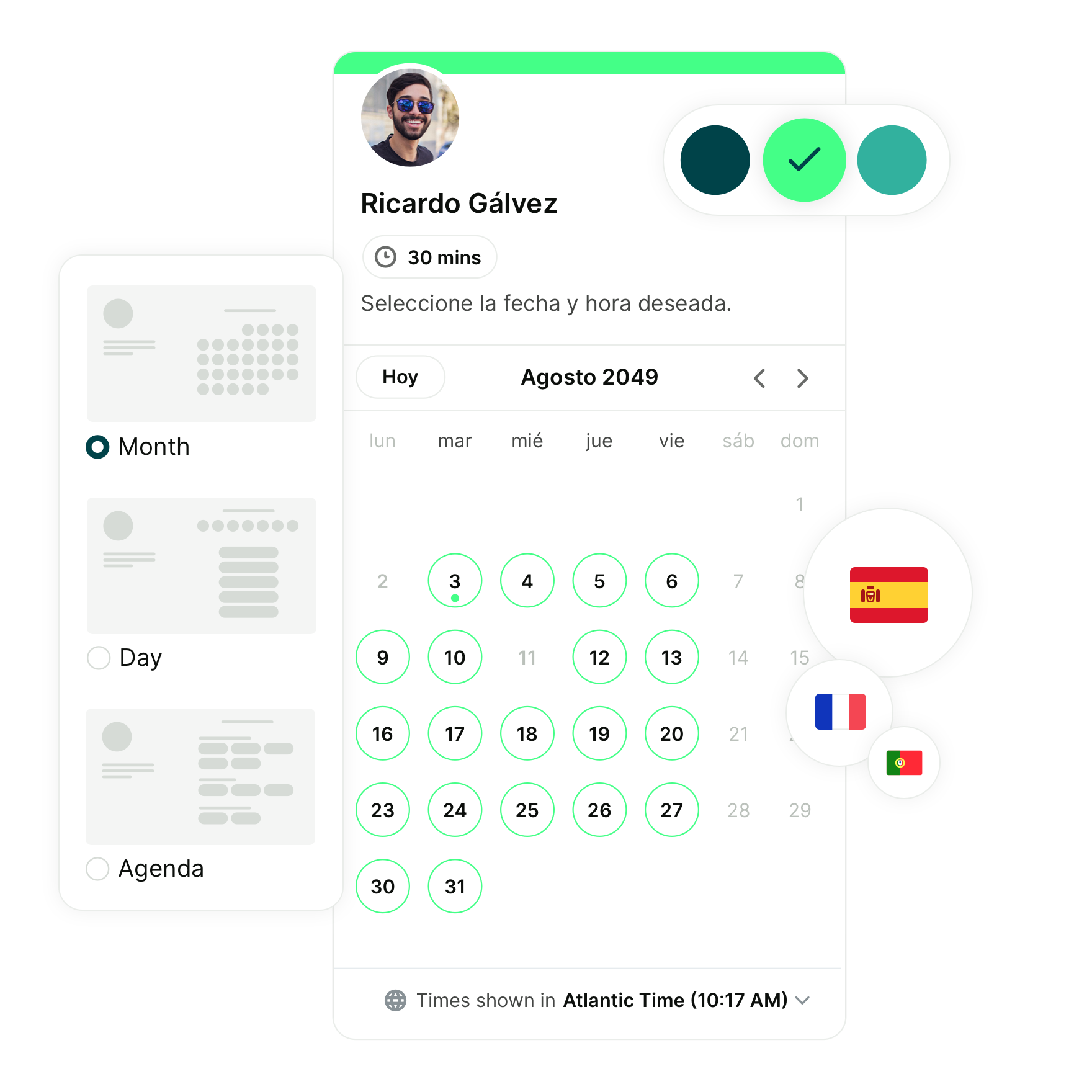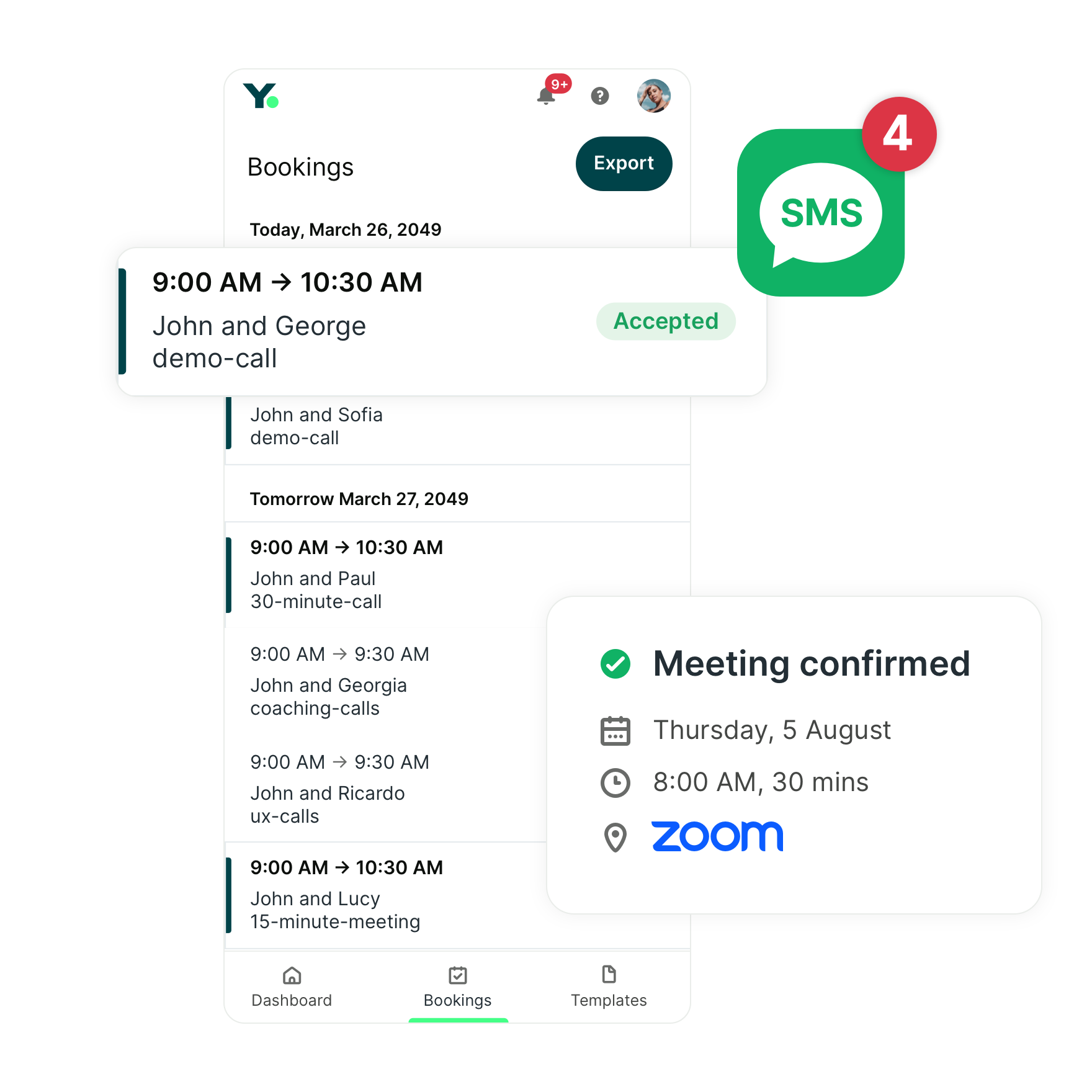5 Sales Team Meeting Agenda Templates That Will Close More Deals
Keep your sales team happy and your pipeline strong. Learn how to run a more effective meeting with these customizable meeting agenda templates.

Hailey Hudson

Ready to book more meetings?

Contents
If you’re looking to build a high-performing sales team, regular team meetings are a must to keep everyone connected, aligned, and on track to hit goals. But too often, managers waste time by running vague, ineffective meetings.
In fact, the University of North Carolina surveyed 182 senior managers and found that 70% of all meetings are a waste of time. That’s a lot of wasted time that could otherwise be spent selling.
So how do you prevent this?
By knowing how to run an effective sales meeting.
A great place to start is by using a tried and tested sales team meeting agenda. That way, you can run your next meeting smoothly and efficiently.
Let’s dive in!
How to prepare for a sales team meeting
The first step to running a productive sales team meeting?
Preparation.
Invest time upfront into planning out each aspect of the meeting. That way, you’ll know exactly how things will run when you get “inside the room” (or on the Zoom call). Follow these steps to ensure you’re maximizing you and your team’s time.
1. Define your purpose
Every good meeting starts with a purpose. By explaining exactly why you’re meeting and what you hope to accomplish, you help ensure the meeting will be productive. Rather than letting the conversation wander in circles, you’ll set a specific goal to achieve during the meeting. And you’ll know the necessary steps to reach it.
2. Tie the meeting back to goals
Remember to tie every meeting back to your sales team’s overall goals. This includes any goals surrounding quota, forecasts, target, or employee engagement. Remaining goal-oriented keeps everyone aligned and moving in the same direction.
3. Have a standing agenda
Follow the same general format for each sales team meeting you hold. That way, everyone will always know what to expect and how to show up prepared every single week. Be sure to block out time for ad-hoc items that are sure to come up throughout the year as well.
4. Keep invites exclusive
As you plan your sales team meeting, only invite people who need to be there. You might find that it makes sense to separate roles like BDRs and AEs into different meetings. Or you could divide sales reps targeting different regions. Either way, smaller meetings (8 people or less) are typically more productive and efficient. And no one wants to waste their time attending a meeting that wasn’t really meant for them.
5. Send the agenda in advance
Make sure all invitees receive meeting reminders, including the agenda, ahead of time. YouCanBookMe will send automatic reminder emails to meeting attendees for you—no need for endless back-and-forth emails. Simply schedule the meeting and then let YCBM send consistent, personalized email reminders so everybody shows up. Attendees will feel more prepared since they’ve had a chance to read the agenda already. And you’ll have more opportunity to prepare in advance, too.

6. Encourage your team to add items
By distributing the agenda before the meeting, team members will have the opportunity to add in their items ahead of time. But, be sure to add a cutoff time for new agenda items—for example, two hours before the meeting—so you’ll be able to show up with answers in hand.
7. Add buffer time
Creating a comprehensive meeting agenda helps ensure you cover everything without unnecessary downtime. But you don’t want the meeting to be too full. Add a buffer that you can use for Q&A or brainstorming. If your agenda is overstuffed, you’ll likely feel rushed as you work to get through all the items.
8. Finalize next steps
Once you’ve finished planning your next sales meeting, remember to define what should happen after the meeting, too. Will you compile the meeting notes and distribute them to attendees? Who’s in charge of defining next steps and assigning tasks? Is another meeting scheduled for next week? You need to prepare to not only run the meeting itself, but to also walk your team through what’s going to happen afterward.
What can you accomplish during a sales team meeting?
Ultimately, you want to leverage sales team meetings to propel your team forward. Let’s look at three ways you can frame these meetings and plan for success:
Find team alignment
Discuss team goals and responsibilities to make sure everyone is aligned. Check in on your team’s progress toward their goals, and adjust where needed.
- Not close to hitting quota? Discuss implementing sales acceleration strategies.
- Did a sales call go extremely well? What can the team learn from that and what should they replicate?
- Is a competitor coming up more frequently? Document where your company wins and align with marketing to create supporting materials for the team.
You can also use this meeting to share any company announcements or updates and how they’d impact the team’s day-to-day.
Discuss new insights
Does anyone have new insights to share? This information can help the entire team succeed. Whether it’s details from a great customer call, constructive feedback from a prospect, or takeaways from a conference, encourage all team members to share their knowledge so everyone can benefit.
Build relationships
Finally, weekly sales meetings are an important opportunity to further cement relationships among your team. Give shout-outs and public praise to sales reps who are doing a great job, increasing their confidence and motivation at work. Or extend the love even further, building relationships with other teams by featuring people as meeting guests. They can share an insight or provide details on an upcoming campaign.
The importance of using a sales team meeting agenda
By creating, distributing, and following a sales team meeting agenda, you’ll be equipped to run a more effective and enjoyable meeting. A strong agenda will help you:
- Keep the meeting structured and on track
- Encourage your team to show up prepared every time
- Establish a centralized place to document meeting notes and next steps
Your agenda will house a list of topics and action items to cover during the meeting. It also provides a blueprint showing the best route to help you work through those topics.
5 Ready-to-use sales team meeting agenda templates
Agendas can help you run a more productive and successful meeting. But you don’t have to build them from scratch. Use these sales meeting agenda templates as a starting point to plan out your next meeting.
General sales team meeting agenda template
Bring your team together with this basic customizable sales meeting agenda template.
|
The goal of this meeting is to review progress on team goals, provide an update on recent changes in company policy, and open up the floor to learn from one another. Agenda items:
|

Meeting agenda template for BDRs
Use this sales meeting agenda template for internal reviews with your Business Development Representatives.
|
The goal of this meeting is to review your recent work, understand customer feedback you’ve received, and provide support as you continue seeking leads. Agenda items:
|

Sales meeting agenda template for field sales reps
Catch up with your field sales reps using this list of action items in your next meeting.
|
The goal of this meeting is to discuss progress on goals, understand what your pipeline looks like, and understand what we can learn from these deals. Agenda items:
|

Sales team forecast meeting agenda template
Get your team on the same page about your current sales forecast using this simple meeting template.
|
The goal of this meeting is to gauge our current sales forecast, including which deals we should focus on during this sales cycle and how we plan to do so. Agenda items:
|

Sales leadership meeting template
Use this meeting agenda to align your sales leaders on goals, forecast, and pipeline.
|
The goal of this meeting is to discuss what adjustments we might need to make to our pipeline or forecast to more easily reach our targets and goals. Agenda items:
|

FAQ about sales meeting agenda templates
What should be included in a sales meeting agenda?
A good sales meeting agenda should include meeting details (location, date/time, and attendees); a meeting objective; and a list of agenda topics to discuss in more detail.
How do you structure a sales team meeting?
It’s often effective to begin a sales team meeting with something that helps build relationships among your team—try a fun icebreaker, or praise an employee who’s done well. Next, review team progress toward your goals and quota. Finally, open up the floor to answer any questions.
How do you run a good sales meeting?
Define an objective for the meeting—something specific you plan to accomplish. Then follow an agenda that walks you through action items to meet that goal. Allow team members to have a voice throughout the meeting, and remember to set next steps before leaving the call.
Subscribe to our newsletter
Get productivity tips, news, articles and resources.
Written by
Hailey Hudson
Hailey is an Atlanta-based, full-time freelance writer who works with clients in the healthcare, marketing, and tech industries. When she's not writing, she's probably belting musical theatre songs or snuggling with her feline WFH supervisor, Windy.



